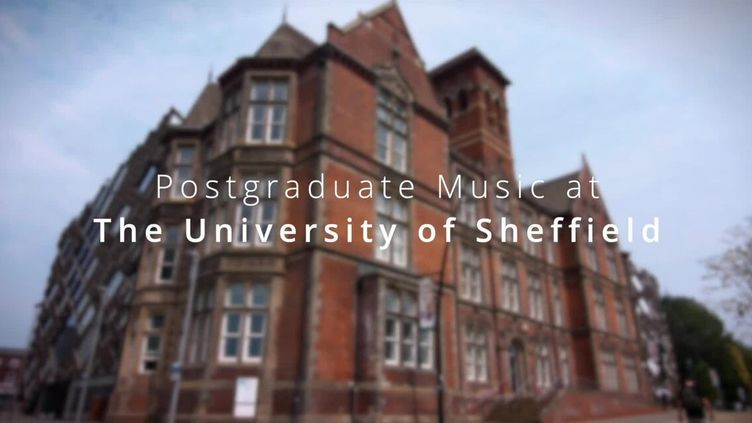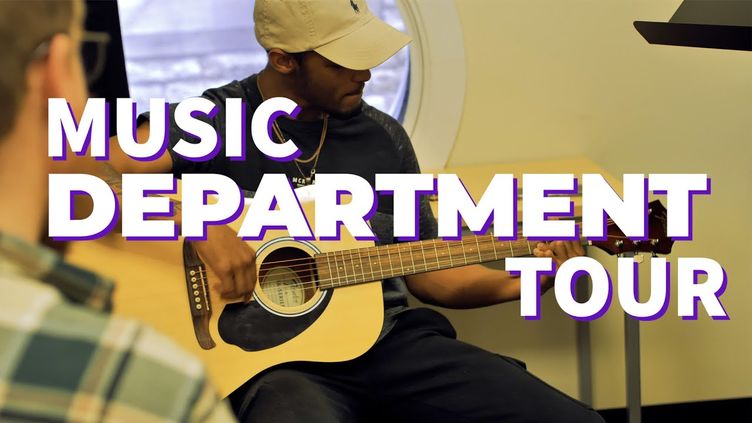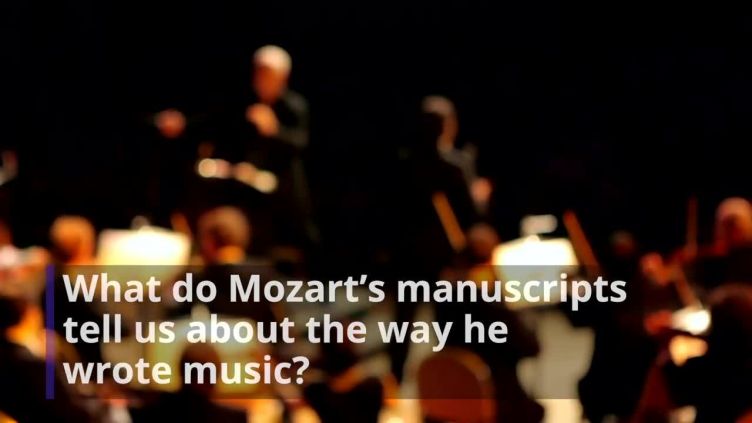Musicology MA
School of Languages, Arts and Societies,
Faculty of Arts and Humanities
-
Start date
September 2025 -
Duration
1 year 2 years -
Attendance
Full-time Part-time
Explore this course:
Apply now for 2025 entry or register your interest to hear about postgraduate study and events at the University of Sheffield.

Course description
This course gives you a wide-ranging introduction to advanced musicological study. Our breadth of expertise in the Department of Music means that you can engage with a range of specialist areas, including:
- Mozart
- music of the classical period
- Renaissance music
- music and visual culture
- eighteenth and nineteenth-century style
- the concerto genre
- the Broadway and Hollywood musical.
You'll explore themes such as gender, musical philosophy and culture, the creative process, performance and reception, and use a range of methodologies to understand how music is created, disseminated and received.
In the first semester, all students take a module on critical musicology. This gives you a grounding in the key concepts of musicological thought and technique, from nationalism and canon to semiotics and aesthetics. You'll then apply these concepts to a specific repertoire in the second semester.
For many students, the dissertation is the climax of their course. You'll have the opportunity to explore a research topic of your own choice on any topic or repertoire. Previous students have explored everything from art and music in Renaissance Italy to gender identity in Disney musicals. A particular strength of our department is that we treat all genres with the same respect, and although we have significant expertise in Western art music, it is by no means more important than other repertoires.
As well as musicological modules, you can take modules in other areas of the curriculum such as performance, music psychology and world music. This gives you the chance to meet students from other MA music courses and provides an interdisciplinary and multidisciplinary grounding in the subject.
Sheffield is the perfect place to complete your MA in Musicology. The Department of Music works closely with the University's Concerts Series and oversees ensembles such as the Symphony and Chamber Orchestras, the Chamber Choir and the Folk Group. Our MA students have performed with these ensembles. One student conducted an edition of a long lost Broadway musical that he reconstructed for full orchestra and cast.
Our students also benefit from a thriving research environment and take part in academic conferences. The University's archives also offer the potential for musicological work, particularly in the collection of scores used by the renowned conductor Sir Thomas Beecham.
Sheffield is celebrated as one of the UK's leading music cities, with dozens of major venues. Sheffield benefits from regular visits from the Halle and Royal Liverpool Philharmonic Orchestras, the nationally important Music in the Round chamber music organisation, and a rich programme of musicals, ballets and operas at the Crucible and Lyceum theatres. Sheffield is particularly known for its folk scene. Our students regularly take part in gigs at smaller venues across the city, as well as the Yellow Arch Studios.
Accreditation
We are an All-Steinway School.
Modules
Core modules:
- Critical Musicology
-
This unit acts as an introduction to key trends and figures in musicology from the mid-twentieth century to the present day. Students will learn techniques and skills related to the literature in the field, and will employ them in an essay on a topic of their own choice.
30 credits - Topics in Musicology
-
This unit gives students the opportunity to develop skills and knowledge in a focused area of musicolgy. Students will explore the literature related to a specific topic in depth, and will write an essay that responds to the current state of the literature in this area. Topics offered will be in line with staff research interests, but the exact number and selection of topics will depend on student demand.
30 credits - Research and Communication Skills A
-
Research and Communication Skills A and B together comprise linked modules delivered in collaboration with the English Language Teaching Centre, directed at all students who wish to work on research and English communication skills - written and oral, in order to reach a variety of audiences interested in music and music research.
15 credits
Research and Communication Skills A runs through Semester 1 covering foundational research skills, including generating focussed research topics; literature search; critical reading; quotation, paraphrasing and summarising; citation; organising information and building academic arguments; and structuring an essay.
Research and Communication Skills B runs through Semester 2, and focuses on developing more advanced critical skills, using evidence, and written and oral communication in a variety of genres and styles. Assessments for these modules provide opportunities to improve academic research and writing skills, which can benefit performance in other modules. They also offer the opportunity to engage with a broad spectrum of written and oral communication, useful for academic and professional contexts - Research and Communication Skills B
-
Research and Communication Skills A and B together comprise linked modules delivered in collaboration with the English Language Teaching Centre, directed at all students who wish to work on research and English communication skills - written and oral, in order to reach a variety of audiences interested in music and music research. Research and Communication Skills A runs through Semester 1 covering foundational research skills, including generating focussed research topics; literature search; academic reading; quotation, paraphrasing and summarising; citation; organising information and arguments; and structuring an essay. Research and Communication Skills B runs through Semester 2, and focusses on developing critical skills, using evidence, and written and oral communication in a variety of genres and styles. Assessments for these modules provide opportunities to improve academic research and writing skills, which can benefit performance in other modules. They also offer the opportunity to engage with a broad spectrum of written and oral communication, useful for academic and professional contexts.
15 credits - Dissertation in Musicology
-
This unit gives students the opportunity to design and complete an extended piece of independent research in musicology. There is an emphasis on originality, and the module is heavily weighted in anticipation of the especially intensive effort required in achieving this pre-doctoral standard (for example, through archival research). Students will be supported through group seminars in which key techniques will be explored; they will then undertake the research under the guidance of a supervisor in tutorial format.
60 credits
Optional modules:
- Critical Listening and the Musical Work
-
Students will consider recordings across a range of genres from European and American music to develop their critical listening skills and understanding of musical works. Classes will cover broader questions in the first half of the module, giving way to focused case studies in the second.
15 credits
Key issues may include:
what is a musical work?;
what is critical listening?;
scores and editions;
positionality;
types and values;
taste and recordings;
reception of recordings;
recording over time;
and other issues and ideas in musical listening.
Weekly listening and research tasks will contribute to an independent project, which will be assessed through a presentation and short essay. - Critical Listening and the Musical Work
-
Students will consider recordings across a range of genres from European and American music to develop their critical listening skills and understanding of musical works. Classes will cover broader questions in the first half of the module, giving way to focused case studies in the second.
30 credits
Key issues may include:
what is a musical work?;
what is critical listening?;
scores and editions;
positionality;
types and values;
taste and recordings;
reception of recordings;
recording over time;
and other issues and ideas in musical listening.
Weekly listening and research tasks will contribute to an independent project, which will be assessed through a presentation and short essay. - Applied Music Psychology: Education, Community and Health
-
This module explores the psychology of music in a variety of settings, from the everyday uses of music to music in education and in therapeutic settings. The emphasis in this module lies in two related areas: the use of music psychology to help solve the practical problems of people's lives (in terms of wellbeing, therapy, education and development) and also to explore music as a social phenomenon, that is understanding the psychology of music as a social and interactive facet of human life.
15 credits - Applied Music Psychology: Education, Community and Health
-
This module explores the psychology of music in a variety of settings, from the everyday uses of music to music in education and in therapeutic settings. The emphasis in this module lies in two related areas: the use of music psychology to help solve the practical problems of people's lives (in terms of wellbeing, therapy, education and development) and also to explore music as a social phenomenon, that is understanding the psychology of music as a social and interactive facet of human life.
30 credits - Principles of Music Industry Leadership
-
The module consists of weekly lectures and seminars, each of which is devoted to exploring key principles underpinning successful music management practice. Thus for example seminars will focus upon music policy, digital rights revenues and audience research and engagement. The module will give students the opportunity to investigate the principle(s) of most interest to them in the context of a specific management environment such as the grant-in-aid, independent and global music sectors. The intention of the module is to enable students to broadly identify multiple principles in context and specifically apply one to a chosen specialist area.
30 credits - Strategies for Funding Music and The Arts
-
This module provides a practical exploration of funding within the music and arts sectors, equipping students with the knowledge and skills to identify funding opportunities, create compelling grant applications, and understand the nuances of monitoring and evaluation. Through a series of lectures, students will dissect current market trends in arts funding, learn quantitative and qualitative research methods for evaluation, and master the art of report writing. The module aims to demystify the process of securing funding by offering step-by-step guidance on developing successful applications, from initial research to final submission. Emphasis will be placed on understanding funders' criteria, budgeting, and the critical skill of effectively presenting proposals, ensuring students are well-prepared to navigate the competitive landscape of arts funding.
15 credits - Performing South Asian Rhythm
-
The unit provides an opportunity to integrate practice in an unfamiliar musical genre. Taught in practical classes, the unit will focus on the music of one tradition hitherto unfamiliar to the class in question, requiring them to learn vocal or instrumental performance in that style. Students will back up their practice-based understanding of the world music tradition with an online learning diary and theoretical knowledge derived from the ethnomusicological literature. Their practical learning leads to a performance examination.
30 credits
The content of our courses is reviewed annually to make sure it's up-to-date and relevant. Individual modules are occasionally updated or withdrawn. This is in response to discoveries through our world-leading research; funding changes; professional accreditation requirements; student or employer feedback; outcomes of reviews; and variations in staff or student numbers. In the event of any change we will inform students and take reasonable steps to minimise disruption.
Open days
An open day gives you the best opportunity to hear first-hand from our current students and staff about our courses.
Duration
- 1 year full-time
- 2 years part-time
Teaching
Teaching is through seminars, reading group, graduate study days and individual tutorials. These are combined with departmental study days and extracurricular performance opportunities, all of which makes for a stimulating and supportive study environment.
Department of Music students study at the heart of the campus in our Jessop Building, Soundhouse and performance facilities. We timetable teaching across the whole of our campus.
- Learn more about your supervisors
-
Changes to the teaching staff on the programme are possible, but are likely to include:
Assessment
Assessment is through essays, short presentations and a dissertation. Written essays will assess your knowledge of a broad range of current research practices along with your skills in evaluation, analysis, criticism, information organisation and writing.
Your career
Many of our graduates have found success in the music industry, while a large number have gone onto teach or work in creative arts organisations. Others have stayed to continue their studies at PhD level, or taken up offers to study further at leading music conservatoires.
By joining a leading Russell-Group University you'll experience an outstanding teaching and learning environment. The multidisciplinary approach will provide you with a well-rounded skill set to succeed in a wide range of rewarding career paths.
School
School of Languages, Arts and Societies
Our department ethos combines high achievement with a sense of community and a shared passion for music. Our internationally recognised research informs our high-quality teaching and our student experience is collaborative, supportive and inspiring.
Sheffield is celebrated as one of the UK's leading music cities, with dozens of major venues from the City Hall and Crucible to Yellow Arch Studios and the Foundry, covering all music genres. This brings with it a host of opportunities for our students to get involved in professional music-making of the highest quality.
We work closely with the University's Concerts Series and oversee ensembles such as the Symphony and Chamber Orchestras, the Chamber Choir and the Folk Group, so our MA students have the opportunity to perform and develop ensemble skills with their peers.
Student profiles
I feel I have grown and developed as an academic during my MA at Sheffield. The support and encouragement from the staff is exceptional and I believe I am now more than equipped to move on to a PhD thanks to this course.
Ben Redmayne
MA Musicology
Entry requirements
Minimum 2:1 undergraduate honours degree in a relevant subject.
Subject requirements
We accept degrees where Music is a named component.
We may also consider other degree subjects if you can evidence engagement with music, e.g. through modules studied, professional or amateur music performance etc.
English language requirements
IELTS 6.5 (with 6 in each component) or University equivalent
If you have any questions about entry requirements, please contact the school/department.
Fees and funding
Alumni discount
Save up to £2,500 on your course fees
Are you a Sheffield graduate? You could save up to £2,500 on your postgraduate taught course fees, subject to eligibility.
Apply
You can apply now using our Postgraduate Online Application Form. It's a quick and easy process.
The school running this course will change its name before September 2025. On the online application form, please select Faculty of Arts and Humanities and School of Languages, Arts and Societies when applying for this course.
Contact
Any supervisors and research areas listed are indicative and may change before the start of the course.
Recognition of professional qualifications: from 1 January 2021, in order to have any UK professional qualifications recognised for work in an EU country across a number of regulated and other professions you need to apply to the host country for recognition. Read information from the UK government and the EU Regulated Professions Database.











